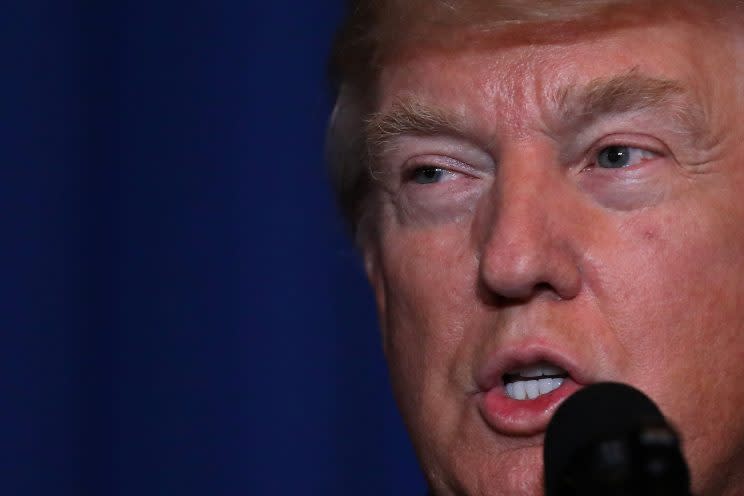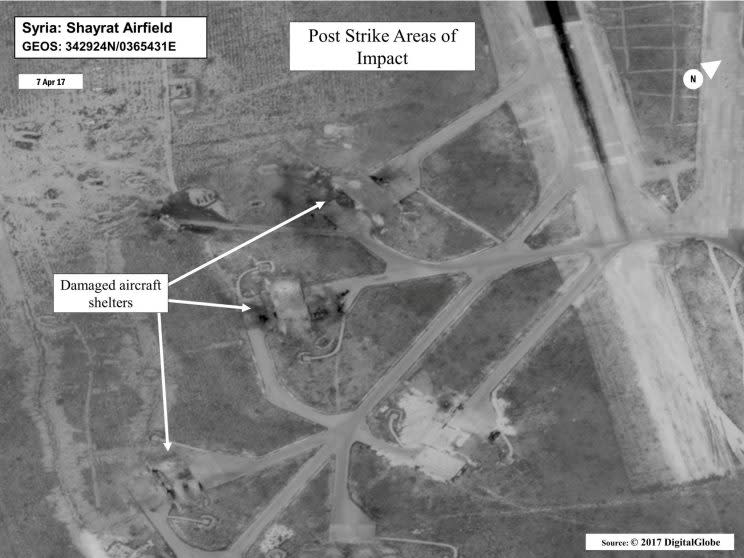Trump said Obama needed war authority from Congress. Will he ask for it now?
WASHINGTON — Four years ago, Donald Trump insisted that then-President Barack Obama needed congressional approval for military strikes inside Syria after a chemical attack blamed on Bashar Assad’s government. Top Democrats and some Republicans in Congress say it is now President Trump’s duty to seek similar war-making authority.
In August 2013, Trump delivered his blunt message on Twitter. “What will we get for bombing Syria besides more debt and a possible long term conflict? Obama needs Congressional approval,” the entrepreneur said.
Nearly four years later, some lawmakers are sending a similar message to the new commander in chief after he rained missiles on a Syrian airbase thought to be the point of origin for a regime chemical attack earlier this week. Syria’s government has rejected blame for the atrocity, which killed dozens of civilians, including children, in an area near Turkey’s border mostly controlled by anti-Assad rebels, and drew global outrage.
Slideshow: Suspected Syria gas attack kills dozens, including children >>>
Apart from Sen. Tim Kaine, D-Va., who branded the missile strikes “unlawful” because Congress had not authorized them, most top lawmakers of both parties have welcomed Trump’s decision and are now focusing on him getting formal authority only if he plans to widen the conflict.
“Tonight’s strike in Syria appears to be a proportional response to the regime’s use of chemical weapons,” Democratic House Minority Leader Nancy Pelosi said late Thursday. “If the president intends to escalate the U.S. military’s involvement in Syria, he must to come to Congress for an Authorization for Use of Military Force which is tailored to meet the threat and prevent another open-ended war in the Middle East.”
Pelosi followed up on Friday by writing Republican House Speaker Paul Ryan to say he should call Congress back to work to debate and vote on Trump’s approach.
Related: U.S. attacks Syrian air base >>>
A spokesman for Ryan, Doug Andres, responded that “the chemical weapons attack committed by the Assad regime was a flagrant violation of international standards, and preventing a deepening of the humanitarian crisis and instability in Syria is clearly in the United States’ national interest.”
Andres continued: “As such, last night’s response was fully within the president’s authority. It is now appropriate for the administration to consult with Congress as it considers next steps to resolve the long-running crisis in Syria.”
For the moment, top Trump aides have signaled that Thursday’s strikes were purely in response to the chemical atrocity two days earlier, not the first salvo in a military campaign to remove Assad — an escalation that could bring the United States in direct conflict with Russia, his regime’s patron. Secretary of State Rex Tillerson on Thursday described Washington’s goals as first, defeat the so-called Islamic State; second stabilize Syria and end its civil war; third, rally a global coalition behind the idea of ousting Assad “through a political process.”

It’s not clear what it will mean to “consult” Congress, as a practical matter. A senior administration official told reporters on Friday that the president acted pursuant to his authority under Article 2 of the Constitution, which makes him commander in chief. And, the aide said, top officials including Vice President Mike Pence are in “constant contact with congressional leaders.”
On Thursday night, Trump laid out conventional U.S. rationales for unilateral military action in a way that suggests he does not see a need for formal authority from Congress. The president said it is in the “vital national security interest of the United States to prevent and deter the spread and use of deadly chemical weapons.” Continued chaos in Syria, and the resulting refugee flows and regional tensions, are “threatening the United States and its allies.” Trump made a humanitarian case, citing the “beautiful babies” seen gasping or dead in images from the attack, and declared that Syria violated the Chemical Weapons Convention.
Whatever happens in Congress, it’s virtually certain not to result in a declaration of war, a task the Constitution reserves for the legislative branch. The United States has declared war formally against 11 nations in just five wars in its history: The War of 1812, the Mexican-American War, the Spanish-American War, World War I and World War II. Technically, America’s longest war — the Afghanistan operation launched after Sept. 11 — isn’t a declared war. Neither were Korea, Vietnam, Panama, nor Iraq.
The far more common legal tool has been an Authorization for Use of Military Force, better known in Washington as an AUMF. Congress passed two under George W. Bush, including one in 2002 to authorize the invasion of Iraq. The first one, approved shortly after the 9/11 attacks, has proved more far-reaching. For years, Obama resisted seeking an AUMF against the Islamic State, also known as ISIS, because that group grew out of al-Qaida and was arguably covered under the 2001 resolution. (Kaine, who has long called for an AUMF against ISIS, at one point rejected that as an “Alice in Wonderland” argument.)
But Trump is unlikely to seek an AUMF for this sort of one-off military action, in which American soldiers are not directly in the line of fire. Presidents don’t often seek formal authorization for covert raids or missile strikes, and it’s unclear whether Congress could craft language that would earn a bipartisan majority.
“I would be glad to get an AUMF for Congress,” Senate Armed Services Committee Chairman John McCain, R-Ariz., told reporters on Friday. “But I am not going to have the lack of this specific AUMF preventing the president of the United States from reacting to blatant war crimes that kill innocent men, women and children.”

Political polarization helped doom Obama’s AUMF request for ISIS, which was dead on arrival when he finally sent it to Congress in February 2015.
The proposal reflected Obama’s national security aides’ desire that it not tie his hands. The document would have authorized airstrikes in Iraq and Syria over the following three years. It would have forbidden the use of American ground troops in “enduring offensive ground combat operations” — a term the Obama White House described as deliberately vague. It also would have allowed strikes against “individuals and organizations fighting for, on behalf of, or alongside ISIL” anywhere in the world.
Democrats have balked at supporting such a sweeping measure. Republicans have pointed to the three-year limit and the ground combat language to argue that the AUMF binds the hands of Obama’s successor.
The truth of the matter is that both sides saw political peril in the president’s proposal. The role Hillary Clinton’s support for the Iraq War played in her 2008 defeat haunted Democrats. And Republicans, who could have voted to remove the language they describe as objectionable, preferred to criticize Obama’s handling of the conflict without taking any steps that might make them co-owners of the strategy.
A lawmaker truly hell-bent on forcing a debate on authorizing military action against Assad’s forces could try to use the 1973 Wars Powers Resolution, a law born of congressional anger at the way successive presidents expanded the bloody conflict in Vietnam.
The law requires the president to notify Congress within 48 hours of introducing U.S. armed forces into conflict or into situations in which conflict is imminent. It also requires the withdrawal of U.S. forces after 60 days, with one 30-day extension, absent a declaration of war or an AUMF.
There’s a catch: This would also require congressional action. And while presidents have cooperated with the reporting requirements, not one has formally endorsed the law as setting constitutionally valid restrictions on the commander in chief.
Read more from Yahoo News:


